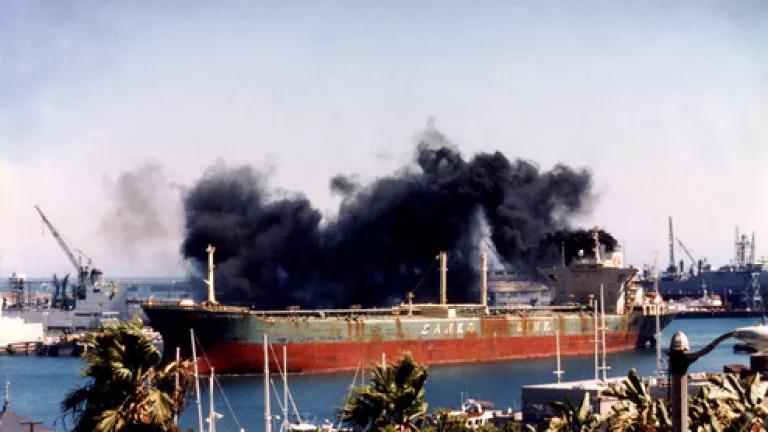
People who live near the Ports of Los Angeles and Long Beach don’t need to study atmospheric science to understand that they have a problem. There is fine, black soot everywhere. They can clean it up – and the next day, it’s back.
This is more than an aesthetic problem. The Los Angeles and Long Beach ports are the dirtiest in the country. The black soot that diesel engines produce in huge amount is killing and sickening people. The number of people killed by diesel pollution in California every year is as great as the number killed in homicides. Rates of childhood asthma near the Ports and the freeways that carry diesel truck traffic from the Ports are climbing. Diesel exhaust contains metals such as mercury and lead that are classified as hazardous wastes by the United States EPA and its California equivalent.
This pollution is essentially unregulated at the Ports. This picture is a scene that a Port neighbor might see on an otherwise clear morning.
Our air team in Santa Monica has been fighting to clean up the air every step of the way, but has also been villainized in the process by local media sympathetic to business interests who don’t want to pay more to clean up their diesel ships, trucks and trains. In fact, the price increase needed to clean up diesel pollution from oceangoing ships like the one pictured above is a fraction of a cent for something the weight of a pair of sneakers.
The business interests favoring the status quo are powerful. We recently lost a case in which we tried to support a State rule requiring ships to use less polluting fuel. This week, NRDC submitted comments in response to an American Trucking Association petition to the Federal Maritime Commission asking the FMC to rule against a clean air action plan designed to clean up Port trucking at both Los Angeles and Long Beach ports. We also anticipate litigation by retailers challenging the Ports’ innovative use of fees on shipping containers to fund the needed cleanup of the Ports.
So what’s next? Probably more lawsuits, which we stand ready to defend. We are also working with both local Ports to craft the strongest possible plans to clean up diesel pollution. The saddest part of this story is that every day of delay allows more deadly soot to fall on the hundreds of thousands of people who live downwind of our local Ports.